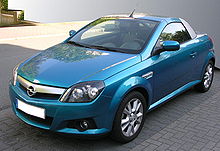Howl

Heuliez [ OLJE ] was founded in 1920 French company that car - bodies manufactured. The main plant was located in Cerizay in the Deux-Sèvres department . The Henri Heuliez Group also had a special design company, SA Heuliez DEA . The company was liquidated in 2013.
The commercial vehicle production in 1980 after Rorthais at Bressuire in the subsidiary Heuliez bus spun off, sold in the early 1990s and is now part of CNH Industrial Group.
history
Horse-drawn carts
Heuliez was founded in 1920 by Adolphe Heuliez to produce horse-drawn carriages .
Car bodies
The production of car bodies began in 1925 with the production of the Type 177B for Peugeot . The production of car bodies was carried out on behalf of other automobile manufacturers such as Citroën , Peugeot, Renault and Opel .
In October 2007 Heuliez asked for judicial protection of creditors .
In August 2008, the Indian car company Argentum took over 60 percent of the shares against the obligation to invest 25 million euros in the company , 10 million of which immediately. France's state investor CDC took a minority stake and invested 5 million euros. Argentum CEO Ajay Singh said Argentum wanted to leverage the company's strong sales platform and development department to create a global auto design company . In addition, they want to open up the fast-growing market for electric cars . From 2011, the electric car developed as “ Heuliez Friendly ” was manufactured as the Mia electric car by the Franco-German company Mia electric . After the bankruptcy of Heuliez, the electric vehicle division was taken over on July 1, 2010 by the main shareholder and pharmaceutical entrepreneur of mia electric GmbH, Edwin Kohl (73.4%).
In March 2009, bankruptcy proceedings had to be filed. The commercial court in Niort announced the liquidation of the company in September 2013 and took effect on October 31, 2013; This ended Heuliez's car production. Parts of the company's assets were taken over by a Société d'économie mixte , in which the Poitou-Charentes region is the majority shareholder (roughly comparable to a mixed-economy company ), which initially continued and eventually wound up the company under the name Fabrique du Bocage .
Omnibuses
In 1937 the Heuliez company produced its first bus .
In the 1970s, Heuliez's bus production was boycotted by the other French bus chassis manufacturers by no longer supplying chassis for bus bodies . For this reason, Heuliez resorted to foreign chassis and built large numbers of bus bodies, especially German chassis from Daimler-Benz ( Mercedes-Benz O 305 and O 305 G) and Magirus-Deutz . In addition, were minibuses on vans basis for. B. Citroën C35 built.
In 1980 the company Heuliez Bus was founded, which entered into a cooperation with Renault . From 1978 onwards, Heuliez developed a new bus series (GX) on chassis from Renault with government funding, which came onto the market in 1985. Heuliez Bus was taken over by Renault and Volvo in 1991 . In 1998 Renault took over the shares in Volvo Bus Corp. , and in 1999 Heuliez Bus became a subsidiary of Irisbus , in which the bus activities of Iveco and Renault were merged. In 2002 Iveco (now part of CNH) took over Renault's shares in Irisbus.
Product examples
Car body shop
Products from the recent past
- Peugeot 604 sedan: 1978–1984
- Renault 5 Le Car Van ( small car ): 1979–1984
- Citroën BX Estate series: from 1983
- Peugeot 205 Turbo 16: from 1985
- Citroën BX Break ( station wagon ): 1985–1993
- Citroën Visa Chrono: 1984
- Citroën Visa Mille Pistes: 1984
- Citroën Visa Convertible (Cabriolet): 1984
- Citroën BX 4TC: 1986
- Citroën CX Break (station wagon): 1989–1991
- Citroën XM Break (station wagon): 1992–1999
- Citroën Saxo electrique ( electric vehicle ): 1996-2003
- Citroën AX electrique: 1995-2000
- Citroën Xantia Break (station wagon): 1995-2000
- Heuliez Intruder (prototype of an SUV roadster / coupé): 1997
- Peugeot 206 CC (roof modules for a convertible): from 2001
- Opel Tigra TwinTop : 2004–2009
- Heuliez Macarena, design study of a four-door glass folding roof convertible based on the Peugeot 407 , presented at the IAA 2007
Omnibuses
- Minibuses with double-width entry with four-part folding door
- Heuliez Coyotte (minibus based on the Citroën C35 )
- GX 17 (minibus based on the Renault Master I, 1982–1990)
- City buses on the chassis of the standard I-bus Mercedes-Benz O 305 / O 305 G
- Heuliez O 305 / O 305 G (articulated bus), (1975–1984)
- GX 44 (with body like GX 107 for Nantes , 1986–1991)
- City buses on the chassis of the Renault PR 100 / PR 180 (1984–1996)
- GX 107, GX 113 (for Marseille ) / GX 187
- Midibus GX 77 H (1990–1999)
- Midibuses (length 9-11 m) The second digit indicates the chronological order of the series, the L stands for longer variant
- GX 117 / GX 117 L / GX 127 / GX 127 L / GX 137 / GX 137 L
- 12 m public service buses on Volvo chassis (1996-2001)
- GX 217 / GX 217 CNG ( Vilnius ) / GX 217 GNV
- 12 m public buses
- GX 317 / GX 317 GNV / GX 317 GPL / GX 327 / GX 327 GNV / GX 337
- Articulated buses
- GX 417 / GX 417 CNG (Vilnius) GX 417 GNV / GX 427 / GX 427 GNV / GX 437
-
Double articulated bus
- GX 237
Web links
-
Homepage of the body manufacturer (in English)( page no longer available ) - Homepage of the bus manufacturer Heuliez
Individual evidence
- ↑ http://news.caradisiac.com/Heuliez-sous-protection-006
- ↑ Lutz Meier: Indians save Heuliez bodywork company
- ↑ Heuliez Macarena: 407 as a convertible coupé. Auto Motor und Sport , January 25, 2006, accessed April 20, 2017 .


